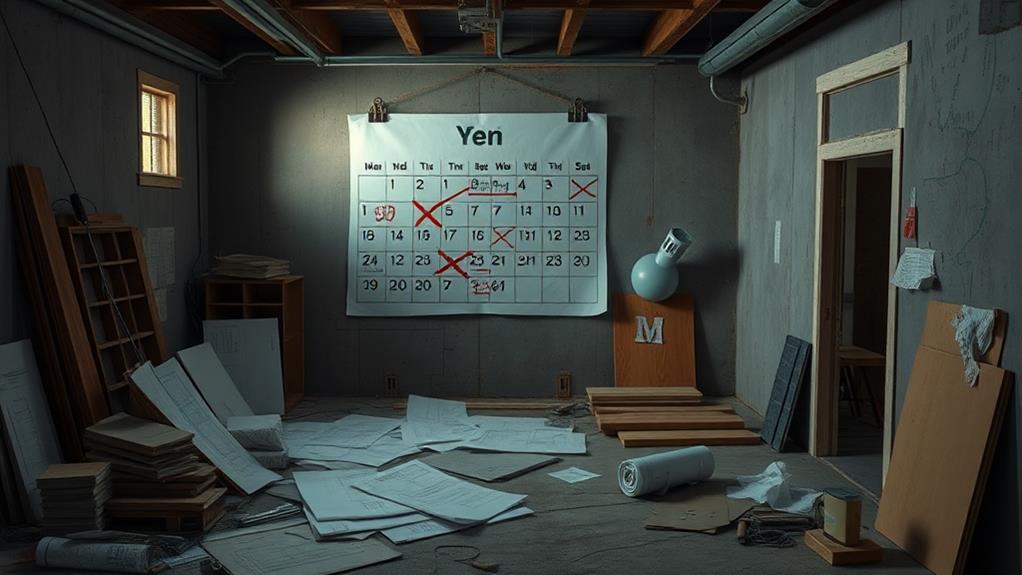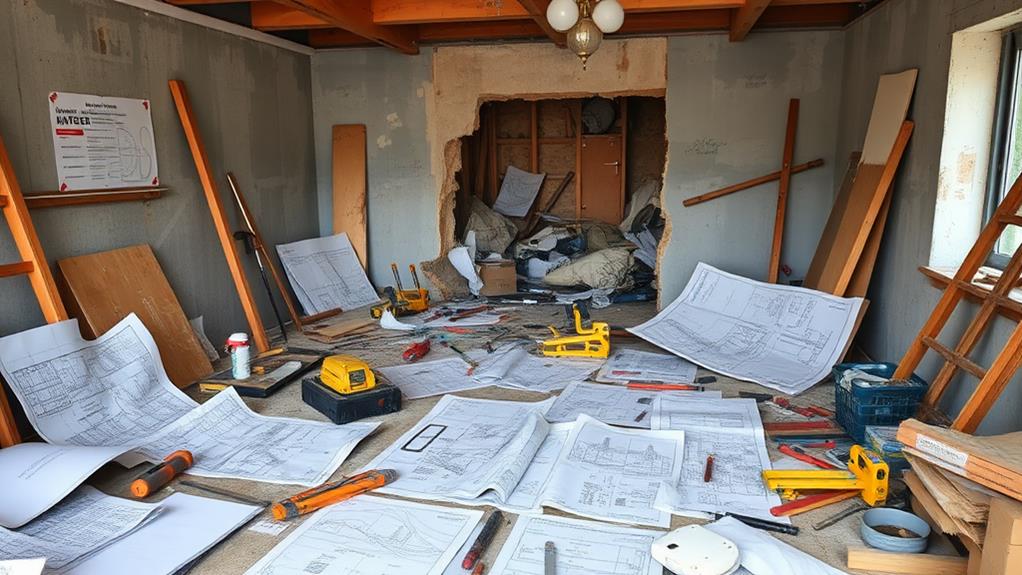When renovating your home, avoid key mistakes with contractors. First, research them thoroughly by checking references and portfolios. Next, don't ignore the importance of detailed contracts, as they clarify the scope of work and prevent hidden fees. Underestimating project timelines can lead to frustration, so add a buffer for delays. Maintain proper communication to tackle unexpected challenges. Avoid choosing contractors based solely on price, as this can lead to quality issues. Finally, always secure necessary permits and set a realistic budget that includes contingency funds. Being aware of these points will help you manage your renovation project more smoothly.
Not Researching Contractors Thoroughly

When diving into a renovation project, you can't afford to overlook the importance of thoroughly researching contractors. If you don't, you risk hiring unqualified professionals, which can lead to poor workmanship and project delays. Start by gathering at least 10 to 20 references. This will give you a clearer picture of a contractor's performance and reliability.
Additionally, consider checking reliable local contractors to guarantee you have access to vetted professionals in your area.
Don't forget to verify their licensing and insurance. Working with unlicensed contractors can expose you to legal issues and safety risks. You want to ascertain that the contractors you consider comply with local building codes, which is vital for a successful renovation.
Researching local contractors also helps you gauge their familiarity with the specific regulations in your area. Additionally, checking online reviews and testimonials can reveal patterns of customer satisfaction or dissatisfaction, helping you make informed decisions.
Ignoring Detailed Contracts
While it might seem tempting to skip the fine print, ignoring detailed contracts can lead to major headaches during your renovation. Detailed contracts are vital for clarifying the scope of work, making certain both you and the contractor understand what to expect. Without clear terms, misunderstandings about products, materials, and labor costs can arise, resulting in unexpected expenses.
When you hire a pro, it's important to have everything in writing. Contracts should specifically list line items, preventing hidden fees that can pop up later. You should also consider having a legal expert review your contract. This can help identify any confusing terms that might lead to disputes down the line.
Trust your instincts about a contractor's professionalism. If their contract seems vague or lacks detail, it might be a red flag.
Additionally, if any changes to the original agreement occur, make certain to document them in writing as change orders within the contract. This way, you'll avoid confusion and guarantee both parties agree on modifications.
Taking the time to focus on detailed contracts can save you from a lot of stress and guarantee a smoother home renovation project.
Underestimating Project Timelines

Underestimating project timelines can have a domino effect on your renovation, often leading to significant delays. Many homeowners find that renovations take 20% longer than initially planned due to unforeseen issues like weather, supply chain disruptions, or contractor scheduling conflicts.
It's easy to overlook the time needed for permitting and inspections, which can add weeks or even months to your project's completion.
When you don't communicate clearly and plan in detail with contractors, misaligned expectations can arise, causing project timelines to extend beyond original estimates. Contractors often recommend adding a buffer of 10-20% to your proposed timeline to account for these potential delays, guaranteeing a smoother renovation process.
Additionally, failing to take into account the time required for material selection and procurement can worsen timeline underestimations, especially during periods of global shortages or shipping delays.
By recognizing these factors upfront, you can better manage your renovation budget and avoid unexpected stress. Always remember to ask your contractors for realistic timelines and heed their advice to make certain your project stays on track.
Taking these steps can help you achieve a successful renovation without the frustration of delays.
Skipping Proper Communication
When you skip proper communication with your contractor, it can lead to confusion and costly mistakes.
Establishing clear expectations from the start and scheduling regular updates helps keep everyone on the same page.
Establish Clear Expectations
Effective communication is essential for a successful renovation, and establishing clear expectations with your contractor should be a top priority. When you start your project, make sure both you and your contractor fully understand the scope of work, timelines, and budget. This clarity can prevent misunderstandings and keep everyone aligned on project goals.
Document all discussions and agreements in writing to create a reference point that minimizes the risk of discrepancies later. For instance, if everyone is on the same page about the budget, you're less likely to face costly change orders that can increase project costs by up to 20%.
Regular communication throughout the renovation process is vital, as studies show that projects with consistent updates experience fewer delays and issues.
Actively engaging with your contractor through scheduled check-ins fosters a collaborative environment, which enhances overall project efficiency and satisfaction.
Schedule Regular Updates
Maintaining open lines of communication with your contractor is essential for a successful renovation, and scheduling regular updates can help make that happen.
Here are a few reasons why you should prioritize these check-ins:
- Align Expectations: Regular updates guarantee both you and your contractors are on the same page regarding project progress and goals.
- Identify Issues Early: Consistent communication helps spot potential problems before they escalate, which can save time and money.
- Enhance Accountability: A set schedule for updates fosters transparency, making it clear who's responsible for what during your home renovations.
- Document Everything: Keeping records of discussions during these updates serves as a handy reference, helping avoid misunderstandings.
Choosing Based Solely on Price

When you choose a contractor based solely on price, you risk hidden costs that can turn your renovation into a financial burden.
It's crucial to prioritize quality over cost, as many homeowners who focus only on the lowest bid end up unhappy with the results.
Take the time to research contractor qualifications and compare bids, looking for the best overall value instead of just the cheapest option.
Hidden Costs Risk
Choosing a contractor based solely on the lowest bid might seem like a savvy way to save money, but it often leads to hidden costs that can derail your renovation budget.
Here are four significant risks you should consider:
- Subpar Materials: Cheaper bids may use lower-quality materials that won't last, leading to future expenses.
- Rushed Work: Contractors cutting corners to meet low bids often produce shoddy workmanship, resulting in repairs.
- Unexpected Expenses: Many projects exceed initial budgets by 10-20% due to unforeseen issues, so be prepared for additional costs.
- Lack of Transparency: Contractors who offer suspiciously low quotes may omit necessary expenses, leaving you with unexpected financial strain.
To protect your budget and timeline, request detailed quotes that break down costs for materials and labor.
Investing in quality workmanship upfront can save you money in the long run, as choosing cheaper options often leads to more frequent repairs.
Remember, these hidden costs can accumulate quickly, turning your renovation dream into a financial nightmare.
Prioritize transparency and quality to guarantee your project runs smoothly and stays within budget.
Quality Over Cost
Opting for the lowest bid might seem like a smart financial decision, but it can backfire dramatically during your renovation. Choosing a contractor based solely on price often leads to hidden costs and quality issues.
A study by the National Association of Home Builders revealed that 80% of homeowners regret selecting the cheapest option due to dissatisfaction with the quality craftsmanship. When contractors charge considerably less, they might cut corners, use lower-quality materials, or even skip important permits, which can cause problems down the line.
Investing in a reputable contractor may seem pricier upfront, but it actually saves you money in the long run. Research shows that homeowners working with quality contractors can save up to 20% on maintenance and repairs compared to those who opted for the lowest bid.
It's essential to compare multiple bids and focus on overall value rather than just the initial cost. Look for references, past project success rates, and the contractor's reputation to guarantee you're making a wise investment.
Research Contractor Qualifications
Focusing solely on price often overshadows the importance of evaluating a contractor's qualifications. When you choose a contractor based only on their bid, you might miss key elements that guarantee a successful renovation.
Here are four important factors to take into account:
- Experience: A contractor with extensive industry experience can navigate challenges effectively.
- Past Projects: Reviewing their previous work gives you insight into the quality craftsmanship you can expect.
- Customer Testimonials: Feedback from past clients can reveal a contractor's reliability and professionalism.
- Licensing and Insurance: Verifying these credentials protects you from potential legal issues and hidden costs.
Overlooking References and Reviews
When hiring a contractor for your renovation, neglecting to check references and reviews can lead to costly mistakes. Overlooking references can leave you unaware of a contractor's reliability and quality of work. It's crucial to gather at least 10-20 references to get a thorough evaluation of their past performance.
In addition to references, online reviews and testimonials from previous clients are incredibly valuable. They can give you insights into customer satisfaction levels and how well the contractor delivers on promises.
Reviewing a contractor's portfolio, showcasing their past projects, helps you assess the quality and style of work you can expect.
Don't hesitate to contact former clients directly. This can reveal important details about a contractor's communication, adherence to timelines, and responsiveness to issues.
A contractor with positive references and strong reviews is more likely to provide a smoother renovation experience, while those without a solid track record may lead you into potential pitfalls.
Neglecting Permits and Regulations

When you're planning a renovation, don't forget about permits and local regulations.
Ignoring these can lead to fines, project delays, and even safety issues if your work doesn't meet building codes.
It's crucial to check with your contractor to verify everything's compliant, so you can avoid costly problems down the line.
Importance of Permits
Skipping permits during renovations might seem like a way to save time and money, but it can lead to serious complications down the line. Here are four important reasons to prioritize permits:
- Legal Compliance: Building permits guarantee that your renovations meet local building codes, protecting both safety and structural integrity.
- Cost Avoidance: Work done without permits can result in costly fines and the need to undo completed work to comply with regulations.
- Time Management: The permitting process can vary in duration, so it's crucial to factor in the time required to secure permits when planning your renovation timeline.
- Multiple Permits: Some renovations may require different types of permits, like electrical or plumbing, making it necessary to understand local regulations.
Engaging with a design-build firm can simplify this permitting process, as they typically manage the acquisition of necessary permits and guarantee all work complies with current regulations.
Don't let the excitement of your renovation lead you to neglect permits; it's a vital step that safeguards your project and investment.
Prioritizing permits now can save you significant headaches later.
Local Regulations Compliance
Neglecting local regulations and permits can lead to a cascade of problems that jeopardize your renovation project. When you fail to obtain the necessary permits, you risk facing costly fines and may even need to redo your work to meet compliance standards.
Local building codes set specific requirements for renovations, and ignoring them can lead to legal complications and a decrease in your property's value.
It's your responsibility to research which permits are required for your renovation before you start. Working without the proper permits can also void warranties on construction work and materials, leaving you unprotected against future issues.
To avoid these pitfalls, consider engaging a design-build firm. These companies can simplify the permitting process, as they typically handle permit acquisition and guarantee adherence to local regulations compliance.
Consequences of Ignoring
Ignoring the importance of permits and regulations can lead to severe repercussions that extend far beyond mere fines. Here are some consequences you might face:
- Fines: Skipping necessary permits can result in fines ranging from hundreds to thousands of dollars, depending on local laws.
- Tear-downs: If renovations are done without the proper permits, you may be forced to tear them down or modify them to meet building codes.
- Void warranties: Ignoring regulations can void warranties on your renovations, leaving you responsible for any damages or issues that arise later.
- Selling challenges: If unpermitted work is discovered during inspections, it can decrease your property's value or lead to costly repairs.
These common home renovation mistakes can expose you to legal liabilities, especially if accidents occur due to unsafe practices.
It's crucial to understand that complying with permits and regulations isn't just about avoiding fines; it's about ensuring safety and protecting your investment.
Don't put yourself at risk—make sure all your renovations are legally compliant. Taking these steps can save you money and stress down the line.
Failing to Set a Realistic Budget
When you commence a renovation project, establishing a realistic budget is vital to avoid financial pitfalls. Many homeowners make the mistake of underestimating costs, which can lead to trouble down the line. Renovations often exceed initial estimates, with average expenses reaching $15,000 or more.
As a result, it's essential to detail all potential expenses, including materials, labor, permits, and any temporary housing you may need during extensive renovations.
Additionally, you should set aside a contingency fund of at least 20% of your total budget. This fund helps cover unexpected costs that may arise, like repairs needed to meet building codes. If you don't account for these hidden costs, you risk financial strain and project delays.
Moreover, if a contractor's quote seems considerably lower than others, it might indicate hidden fees or a lack of quality. Always seek detailed quotes and make thorough comparisons to guarantee you're making an informed decision.
Not Planning for Contingencies

Underestimating costs isn't the only financial misstep homeowners make during renovations; failing to plan for contingencies can be just as detrimental. Unexpected events often arise, so it's crucial to set aside an additional 10-20% of your total budget for these contingencies.
Here are some common issues to keep in mind:
- Supply Chain Delays: Materials mightn't arrive on time, which can push your project back.
- Hidden Structural Issues: You may discover problems like mold or termite damage once you start digging into walls or floors.
- Contractor Scheduling Conflicts: Your contractor may encounter other commitments that delay your renovation.
- Design Changes: You or your family might decide to change plans midway, leading to extra costs.
To avoid these pitfalls, establish a clear communication plan with your contractors. Regularly review the project's progress and adjust your contingency plans as needed.
This proactive approach helps you stay prepared for any unexpected challenges that may arise. Remember, a well-prepared budget with contingencies can save you from stress and financial strain during your home renovation journey.
Rushing the Decision-Making Process
A rushed decision-making process can derail your renovation before it even starts. When you hurry, you might hire unqualified contractors, overlooking the importance of thorough research and vetting. This is one of the most common mistakes you can make.
Quick decisions often lead to missing vital details, like contractor references and evaluations of past projects, which are essential for a successful renovation.
If you accept the first contractor's quote without comparison, you could miss out on better options and competitive pricing. Taking the time to gather multiple quotes helps you find the best fit for your project.
Additionally, inadequate planning can create unrealistic expectations regarding timelines and your budget. This often results in unexpected costs and delays.
Rushing the decision-making process can also hinder effective communication with contractors. Misunderstandings about project scope, design choices, and important details like permits and timelines can arise when you don't take the time to discuss everything thoroughly.
To guarantee a successful renovation, make sure to approach the decision-making process thoughtfully, setting a realistic budget and allowing ample time for planning and discussions.
Conclusion
In your renovation journey, it's wise to tread carefully and dodge common pitfalls. By thoroughly researching contractors, sticking to detailed contracts, and maintaining clear communication, you can steer clear of headaches down the line. Remember to plan for the unexpected and set a realistic budget. Taking these steps not only guarantees a smoother process but also helps turn your vision into reality without any unwelcome surprises. So, keep these tips in mind, and enjoy your renovation adventure!


Leave a Reply